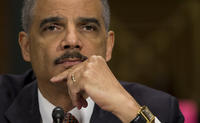-
State agency imposes heavy fine on PG&E for San Bruno blast
The California Public Utilities Commission (CPUC) two weeks ago wrapped up its investigation of a 2010 gas pipeline explosion in San Bruno, California, and recommended that Pacific Gas and Electric (PG&E) pay $2.25 billion for its negligence, which led to the blast.
-
-
A “cauldron of events” has brought the nuclear industry to a halt
Until two years ago, people talked of a nuclear energy renaissance. Now the talk is about nuclear malaise. The Fukushima scare, the emergence of alternative energy sources as a result of fracking, and the lack of action on climate change – which means that limits on fossil fuels are not coming any time soon – have, in the words of one experts, brought the nuclear industry to a halt.
-
-
U.S. secretly obtains AP phone records to identify source of story

In what the AP calls a “massive and unprecedented intrusion” into the news organization’s news work, the U.S. Justice Department secretly gathered two-months-worth of telephone records of the agency’s reporters and editors. The AP says the records listed incoming and outgoing calls to the offices and homes of reporters and editors. The Justice Department began collecting the phone records in order to identify the source or sources of a 7 May 2012 AP story which detailed a secret CIA operation in Yemen to intercept an al Qaeda-sponsored attempt to load an IED onto a U.S.-bound airplane.
-
-
Obama, Democrats walking a tight rope on gay couples and immigration reform
Gay rights organizations are putting pressure on President Obama to offer more support to changing the bipartisan immigration bill so that the foreign partners of gay Americans would have the same rights as the foreign partners of straight Americans. Obama and many Democratic lawmakers are caught between the wishes of an important constituency in the Democratic Party, and a desire to see the immigration overhaul measure passed. Having gay couples enjoy the same rights as straight couples may threaten the bill’s chances of passing.
-
-
IRS targets non-profits perceived to be critical of the government
In the wake of the Supreme Court’s Citizens United ruling, the number of groups applying to the IRS for a tax-exempt status has more than doubled. The IRS inspector general, doing an audit of agency documents relating to such applications, discovered the agency was paying extra attention to groups with the words “tea party” or “patriot” in their names, and to groups which appeared to be critical of the government. Senator Susan Collins (R-Maine) called the situation “absolutely chilling.”
-
-
The two sides in the gun control debate are gearing up for Round 2
A few weeks ago, when the Senate was considering legislation to expand background checks for gun buyers and other gun-control measures, gun-rights advocate successfully organized and campaigned at the grass-root level, exerting pressure on enough wavering Senators, including four Democrats from Red stated who face re-election in 2014. Now, as the Senate majority leader is getting set to introduce the gun-control measures again, supporters of gun control legislation are trying to emulate the grass-root mobilization performance of gun-rights advocates.
-
-
U.S. considering revamping wiretap laws
The White House is reviewing an FBI plan to overhaul surveillance laws in order to make it easier for law enforcement officials to wiretap citizens using the Internet to communicate rather than phone services.
-
-
Privacy, cost concerns check drive for more surveillance cameras

Law enforcement agencies in cities across the United States are campaigning to increase surveillance on city streets, impressed with the effectiveness of video surveillance in helping the Boston Police identify the two suspects in the Boston Marathon bombings. This campaign to expand law enforcement’s surveillance power is likely to run into stiff opposition, as Americans have proven suspicious of allowing the government powers which would infringe on privacy. Expanding surveillance networks also costs money, and these are tight budgetary times.
-
-
Texas becomes gun-friendlier
Texas is already considered one of the most gun-friendly states in the nation, and on Saturday it became even more so when the State House passed twelve different gun bill which would make it easier to own and carry guns in the state. Some of the bills – for example, the one which would punish police officers or government officials by up to a year in jail and a $4,000 fine if they attempt to enforce federal firearms limits in Texas – may be found to be unconstitutional.
-
-
Iowa sex offenders allowed to keep guns
A law enacted two years ago has made it possible for more than fifty sex offenders in Iowa to apply for gun permits. Sheriffs and some lawmakers are uncomfortable with the situation, but advocates for sex offender rehabilitation say such offenders are not necessarily dangerous criminals.
-
-
U.S. may acquire additional land for constructing border fence
A U.S. Customs and Border Protection (CBP) draft plan regarding the final sections of the border fence that separates the United States from Mexico could impact about 100 people, most reside in a nursing home, according to federal documents.
-
-
U.S. policy may lead to growing global shortage of helium

Helium is an essential resource in technologies such as medical imaging, rocket engines, and surveillance devices. In response to the element’s scarcity, the United States has been stockpiling helium since the 1960s in a National Helium Reserve called the Bush Dome, a deep underground reservoir outside of Amarillo, Texas. In 1996 the Helium Privatization Act mandated that the Department of the Interior sell off all the stockpiled helium by 2015. Scientists say that this action discourages the active exploration of helium since companies can buy it from the United States at a cheap price and sell it at a premium. The result will be a growing shortage of helium.
-
-
EPA slams State Department’s Keystone XL pipeline review
The Environmental Protection Agency (EPA) on Monday criticized the State Department’s environmental impact review of the Keystone XL pipeline, saying there was not enough evidence to back up key conclusions in the review on emissions, safety, and alternative routes. The EPA’s comments could have a negative effect on the approval of the project, but if the project is approved, the comments could serve as supporting evidence in any ligation against the pipeline.
-
-
U.S. hospitals shipping sick immigrants back to their home countries

Hundreds of immigrants who are in the United States illegally end up in the hospital only to find out they will be sent home through a removal system run by hospitals trying to avoid the high cost of treating illegal immigrants.
-
-
CBP agent acquitted in abuse case

Customs and Border Patrol (CBP) agent Luis Fonseca was acquitted of one count of deprivation of rights last Friday. The CBP has recently been under scrutiny for its rules on the use of force and the acquittal is considered a victory for the agency.
-
- All
- Regional
- Water
- Biometrics
- Borders/Immig
- Business
- Cybersecurity
- Detection
- Disasters
- Government
- Infrastructure
- International
- Public health
- Public Safety
- Communication interoperabillity
- Emergency services
- Emergency medical services
- Fire
- First response
- IEDs
- Law Enforcement
- Law Enforcement Technology
- Military technology
- Nonlethal weapons
- Nuclear weapons
- Personal protection equipment
- Police
- Notification /alert systems
- Situational awareness
- Weapons systems
- Sci-Tech
- Sector Reports
- Surveillance
- Transportation
Advertising & Marketing: advertise@newswirepubs.com
Editorial: editor@newswirepubs.com
General: info@newswirepubs.com
2010-2011 © News Wire Publications, LLC News Wire Publications, LLC
220 Old Country Road | Suite 200 | Mineola | New York | 11501
Permissions and Policies
Editorial: editor@newswirepubs.com
General: info@newswirepubs.com
2010-2011 © News Wire Publications, LLC News Wire Publications, LLC
220 Old Country Road | Suite 200 | Mineola | New York | 11501
Permissions and Policies
